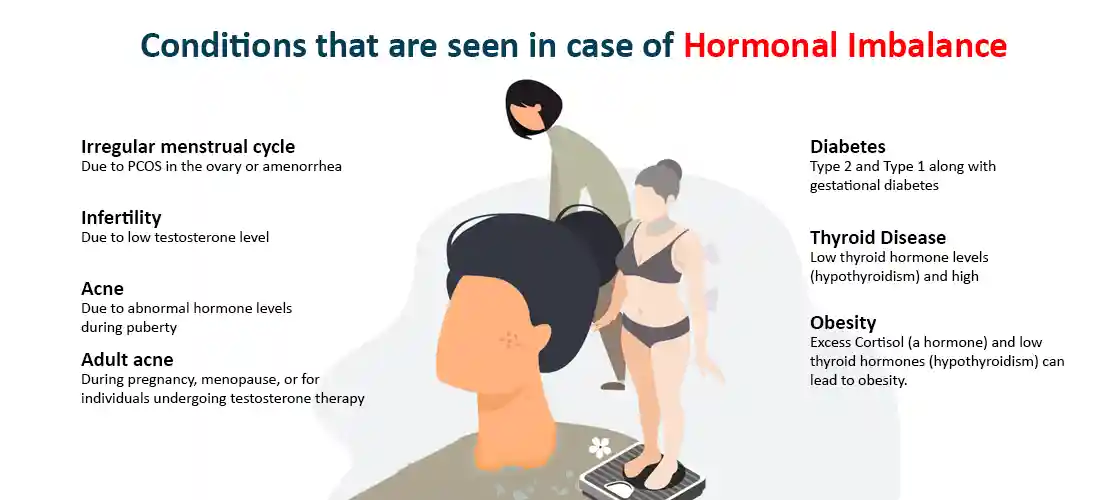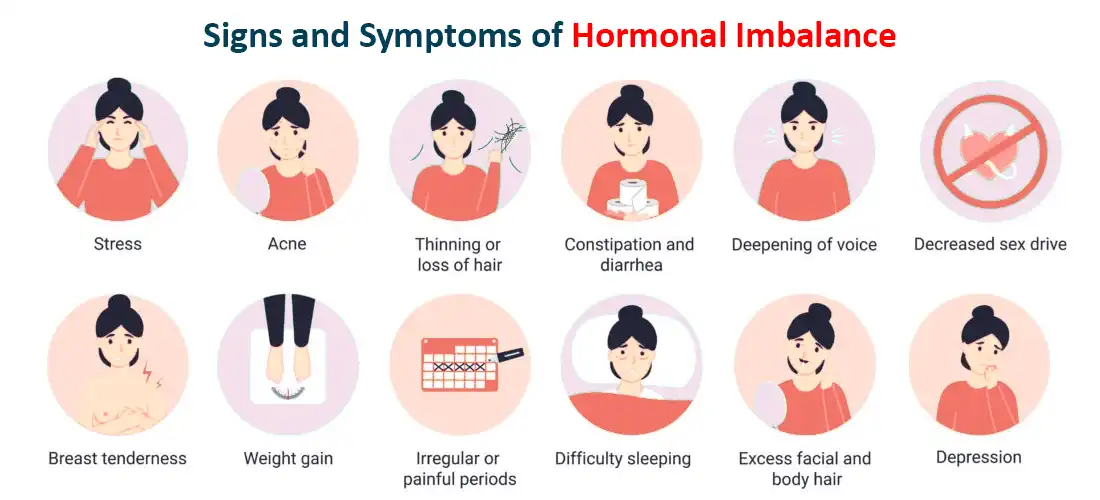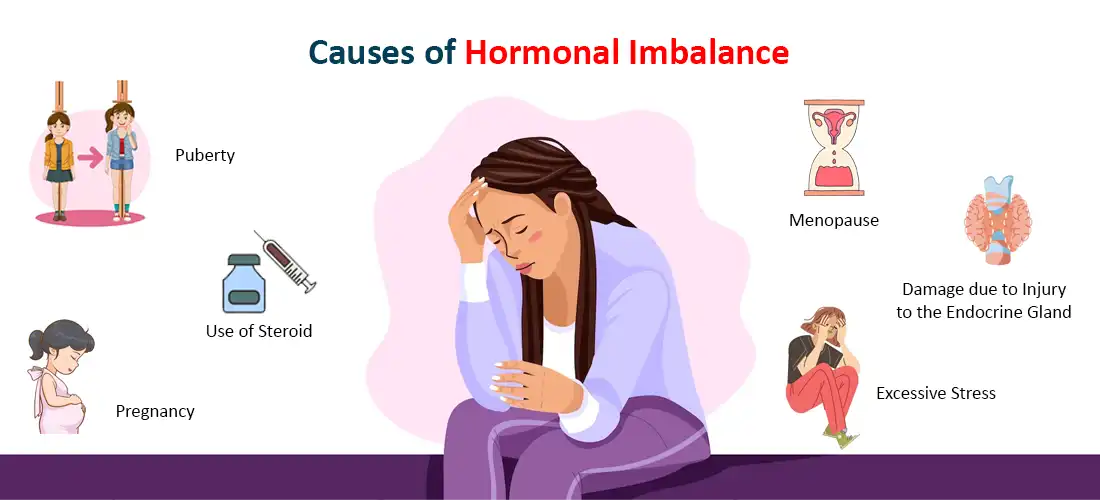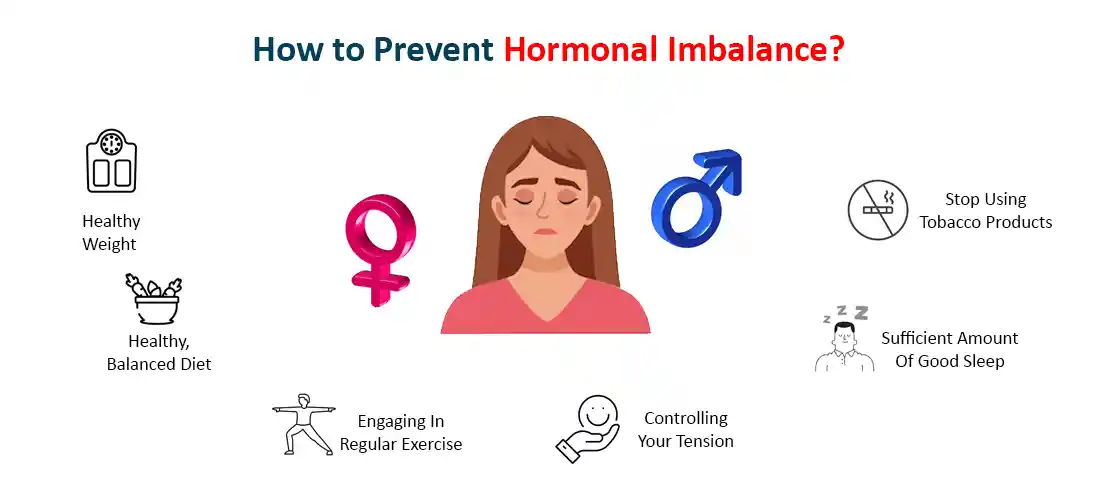
Why be a prisoner of your own hormones if they are not in sync anymore? Understand how the balance can be restored in the healthiest possible ways below and diagnose at earlier stages.
What are Hormones?
The Hormones are known to be the chemicals which circulate in your blood stream and then spread in the body (to different parts) to carry the messages or different signals to different parts of the body.
These carry signals to the organs, the skin, the muscles, and other tissues as follows. These messages convey to your body what has to be done? And how will it be done?
Production of Hormones in the Body
The Pituitary Gland - The 2 sections of the pituitary gland (Anterior and the Posterior) produces number of different hormones which would act on the different target glands or your body cells.
Anterior pituitary
- Adrenocorticotropic Hormone (ACTH)
- Melanocyte-Stimulating Hormone (MSH)
- Thyroid-Stimulating Hormone (TSH)
- Follicle-Stimulating Hormone (FSH)
- Luteinizing Hormone (LH)
- Growth Hormone (GH)
- Prolactin (PRL)
Posterior pituitary
- Oxytocin (Love Hormone)
- Anti-Diuretic Hormone (ADH)
Control of the hormone production is generally monitored a continuous feedback system regulated using the feedback loops.
Facts on Hormones
- Happy Hormones- Endorphins, oxytocin, dopamine, and serotonin. A few easy lifestyle adjustments, such as meditation, exercise, and diet, can raise your levels of these hormones and possibly lift your spirits as well.
- Female Hormones- Estrogens (Endocrine System) are not only present in the placenta, breasts, and ovaries of women; they are also present in the skin, bone, liver, adrenal glands, and even the brain. This helps to explain why a lot of the symptoms, including mood swings, physical aches, and hot flashes, affect multiple facets of health.
- In Times of Stress- Your endocrine system would quickly secrete various hormones (Adrenaline and Nor-adrenaline) at the higher-than-normal levels, to enable the mobilization of more energy to adapt to the situation and the circumstances.
How would you define Hormonal Imbalance?
Hormones in the body are usually considered to be the powerful signals for stimulation of any part of the body. In case of many hormones, either too much or too little of the hormones would cause major changes to the body and lead to the conditions that would require some treatment ahead.
What is the role of Hormones in our Body?
Human body is known to contain more than around 50 hormones that are seen to be discovered so far.
Our endocrine system is made up of many hormones and majority of the tissues (mostly the glands) that are responsible for the production and release of these hormones. Hormones are said to regulate wide range of the physiological functions, some of them is as follows:
- Mood Changes
- Metabolism
- Growth & Development
- Homeostasis (Constant Internal Balance)
- Reproduction
- Sexual Function
- Sleep-Wake Cycle (Biological Clock)

What is the Negative Impact of Hormonal Imbalance?
The various Medical conditions that are caused by the hormone could lead to some issues.
For Example - having too much (Excess) or too little (Low) of levels would have certain causes, symptoms and issues with the health. While most of the imbalances require further treatment, some could be temporary and thus it may go away on its own as well.
The conditions that are seen in case of hormone imbalance are as follows:
- Irregular menstrual cycle: Due to PCOS in the ovary or amenorrhea
- Infertility: Due to low testosterone level
- Acne: Due to abnormal hormone level during puberty
- Adult acne: During pregnancy, menopause or for individuals undergoing testosterone therapy
- Diabetes: Type 2 and Type 1 along with gestational diabetes
- Thyroid disease: Low thyroid hormone levels (hypothyroidism) and high thyroid hormone levels (hyperthyroidism)
- Obesity: Excess Cortisol (a hormone) and low thyroid hormones (hypothyroidism) can lead to obesity.

Signs and Symptoms of Hormonal Imbalance
- Slow Heartbeat or Rapid Heartbeat (Tachycardia).
- Unexplained Weight Gain or Weight Loss.
- Weary And Tired
- Diarrhea
- Hands Feel Tingly & Numb
- Elevated Blood Cholesterol
- Anxiety or Depression
- Thin Skin
- Rough, Dry Skin.
- Irregular Distribution of Body Fat
- Acanthosis Nigricans: Darkening Armpit or Back and Sides of Neck.
- Skin Tags: Small skin Growths
- Burning Sensation while Urinating
Relation between Hormones, Anxiety and Weight Gain
In certain conditions such as Hyperthyroidism, Cushing’s syndrome and Adult-Onset growth hormone deficiency, the patients can experience symptoms of stress and anxiety.
For Anxiety
- Hyperthyroidism: An excess of thyroid hormone in the body is the result of hyperthyroidism. A surplus of thyroid hormone increases metabolic rate. Along with uncommon nervousness, restlessness, and irritability, this can also result in anxiety.
- Cushing's syndrome: Although it's not as prevalent a symptom, excess Cortisol in the body can lead to anxiety, depression, and irritability.
- Growth hormone deficit that develops in adults: Individuals with this condition frequently report experiencing anxiety and/or sadness.
For Weight Gain
- Hypothyroidism: This disorder is characterized by low thyroid hormone levels, which slow down your metabolism. Gaining weight could result from this.
- Cushing's syndrome is brought on by an excess of the hormone Cortisol in the body. Rapid weight gain occurs in the chest, back of your neck (sometimes referred to as "buffalo hump"), abdomen, and face (also referred to as "moon face").
- Menopause: Many females gain weight during the menopause because of hormonal changes that slow down their metabolism. It's critical to keep in mind that this kind of "hormonal imbalance" is normal and expected in life.

What are the Causes of Hormonal Imbalance?
There are certain periods of life that cause more dramatic changes and fluctuations in the hormones, these include the following:
- Puberty
- Pregnancy
- Menopause
Most common causes of the fluctuating levels of hormone or imbalanced hormone levels include:
- Excessive Stress
- Certain Medicines
- Use of Steroid
In general, main conditions that would cause any medically significant hormone imbalances include the following:
- Tumors and Adenomas
- Autoimmune conditions ( Type 1 diabetes, Addison’s Disease, Graves Disease)
- Damage due to Injury to the Endocrine Gland ( Accidental Damage, Bacterial/viral illness, Radiation Therapy)
How can you diagnose Hormonal Imbalances? What tests can you do?
The healthcare might prescribe any further additional tests, such as insulin or glucose tolerance test, to evaluate the hormone levels because some hormone levels fluctuate significantly during the day.
This will be followed by taking a medical history and then perform physical tests ahead.
Guidelines to follow before, during and after the Testosterone Blood Test
Here are some guidelines an individual can refer to once they have decided to undergo Different Hormone Test in
The required documents needed for this test includes your valid government ID and an appropriate Doctor’s prescription.
A. Before the test
- Nothing Specific to prepare for Hormones Test (Multiple) in advance.
- Usually, Fasting may be required for a few hours before the test as per the test (there are some tests which can also be carried out with stomachs full).
- Consumption of water is permissible during the fasting period.
B. During the Test
- During the blood test, the doctor would take the blood sample from the vein in your arm, using the small needle.
- Then, a small amount of blood would be drawn and collected into the corresponding test tube or the vial.
- You might feel a little sting when the needle pricks or while it is being removed. This would usually take less than even five minutes.
C. After the Test
There would be slight tenderness at the injection site without any major concern. This patient is expected to get back to their daily life immediately.
What Hormones can be tested in the urine?
Hormone testing offers the unique diagnostic perspective that urine hormone metabolites testing does. It provides information on how the body breaks down important hormones such as estrogens, progestogens, androgens, cortisol, and melatonin since it evaluates both the parent hormones and the metabolites that correlate to them.
When to Contact the Doctor?
Should you experience any symptoms, seek advice from a licensed healthcare provider who might recommend medication to your symptoms and identify the underlying cause. Surgery to remove any tumors if present might be considered in extreme circumstances or if the medicine is unable to address the issue.
For Free Consultation from the Doctor
Contact- Dr. Ravin Sharma, (MBBS, MD in Radiology)
Available: 24*7*365
Phone Number: +919212125996
Management and Treatment of Hormones
How are disorders of hormones treated?
Hormone levels vary, and depending on the underlying cause, a variety of therapeutic options are available. There are several alternatives, including medication, surgery, radiation therapy, or a combination of these.
HCG Injections are generally used to increase chances of the persons pregnancy, by increasing the level of testosterone and production of sperm.
For example, your physician may prescribe medication to shrink the prolactinoma, a benign (noncancerous) tumor that overproduces the hormone prolactin, or surgery to remove the tumor. This can be tested by the Prolactin hormone test.
Why Ganesh diagnostic and Imaging Centre should be your preference to for different Hormones Tests?
Ganesh Diagnostic and Imaging Centre has a long history of offering its patients exceptional service and attention. Years' worth of happy patients in thousands!
Since 2001, it has grown to be a recognized and well-established diagnostic facility.
Their excellence is backed by NABH and NABL Accreditations.
NABH accreditation is proof of highest standard of care and service provided to the patients. NABL accreditation reflects the competency of laboratories and equipment based on some national and international standards.
Test report is available digitally too.
Ganesh Diagnostic and Imaging Centre is a one-stop solution for getting all kinds of tests done, as all services are available under one roof.
The aim of GDIC is to provide world’s finest technology at the lowest price and Free Home Sample Collection Facility.
The rates of scans are reasonably priced. Ganesh Diagnostic and Imaging Centre also offer FLAT 50% OFF on many tests.
We also provide- Free Home Sample Collection, Free Ambulance Service an d Free Consultation from the Doctor itself.
Some of the Hormone Tests Conducted at Ganesh Diagnostic are as follows:
- Total (T3 & T4)
- TSH (Thyroid Stimulating Hormone)
- Estrogen Total, Serum
- Serum Progesterone
- Testosterone
- Cortisol
- Adrenocorticotropic Hormone (ACTH)
- DHEA (Dehydroepiandrosterone)
- LH (Luteinising Hormone)
- FSH (Follicle Stimulating Hormone)
- Thyroid Profile
- Serum Gastrin
- IGF-1 (Insulin-like Growth Factor 1 Panel)
- 24 Hour Urine Catecholamines
Cost of Hormones Test in Delhi
The different Hormones Test costs vary by region and facility. So constantly get tested at trustworthy diagnostic centers like Ganesh Diagnostic. It is staffed by trained and experienced professionals to assure patient and visitor safety.
The average price for these tests is seen to differ from one center to another. The price of Hormones Test fluctuates as per the market standards. The Report of these tests would usually be received on the same day as the post collection of the required Sample.

How to Prevent Hormonal Imbalance?
Although many hormonal imbalances are unavoidable, you can take specific steps to improve your general health, which may assist maintain a balance of hormones. The steps included are as follows:
- Healthy Weight
- Healthy, Balanced Diet
- Engaging In Regular Exercise
- Controlling Your Tension
- Sufficient Amount Of Good Sleep
- Stop Using Tobacco Products
What is the most important hormone test?
One of the most popular methods for measuring hormone levels is a blood test. Thyroid (T3, T4, TSH) , Cortisol, Estrogen, and Testosterone levels, B-HCG Test can all be found with this test. A women's hormone test will look for different levels of sex hormones than a men's test, so you should obtain a gender-specific test.
What is the most accurate method of hormone testing?
Testing for reproductive hormones is a good use for serum testing because it is dependable. Its benefits include well-established reference ranges and ease of collection—blood is taken from an arm vein—making it suitable for detecting endogenous hormone excesses or shortages.
What is a normal AMH level to get pregnant?
AMH Hormone
The AMH of 1.0-4.0 ng/ml would be considered as the normal AMH level to conceive and get pregnant. The AMH level below level of 1.0ng/ml result in low egg count and this can be an indication of diminishing the ovarian reserve.
What time is best to take Thyrotropin?
Thyrotropin Hormone
After they wake up in the morning, the majority of our patients take thyroid hormone. Breakfast can be consumed 30 to 60 minutes later, along with any milk or coffee. Taking thyroid hormone in the evening, at least three to four hours after eating, is the second most widely used technique.
What time of day is ideal for hormone testing for women?
Most testing is often completed in the luteal phase, which occurs on days 19, 20, or 21. During this time, PMS symptoms are at their worst, which is it is advise d to patients to be tested when they're feeling low.










